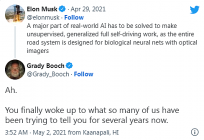I haven't noticed the autonomous vehicles are stillborn, thats because of the continuous engineering updates I receive are contrary to your stillborn statement.
Let's make a note to revisit this thread in a few years.
Why wait? Let's review earnest predictions made just seven or fewer years ago:
In 2015, Baidu’s Wang Jin — who has since resigned from the company — said the startup would be selling driverless cars to Chinese consumers by 2020.
"From 2020, you will be a permanent backseat driver,"
The Guardian said in 2015.
In 2016, Lyft president John Zimmer took to
Medium to claim that “the majority” of trips carried out by the ride-sharing company would happen in
fully autonomous cars “within five years.”
Business Insider boldly predicted in 2016 that 10 million
self-driving cars would be on the road by 2020. It ... also forecast that cars that “can drive from point A to point B and encounter the entire range of on-road scenarios without needing
any interaction from the driver” would “debut in 2019.”
In June 2021
TheNextWeb.com wrote: "We were told there’d be fully-autonomous vehicles dominating roadways across the globe by 2018. When that didn’t happen, we were told they’d be here by the end of 2020. And when that didn’t happen, we were told they were
just around the corner. It seems like now the experts are taking a more pragmatic approach. According to a recent report from the Wall Street Journal, many computer science experts believe we could be at least a decade away from fully-driverless cars, and some believe they
may never arrive."
VentureBeat admitted in May 2022: "We were wrong about the future. Every prediction about self-driving cars has been wrong. We are not living in a future of autonomous cyborgs, and something else has come into focus. ... Since the early days, the problem with self-driving cars has been obvious: there’s no control. When we look at the successful implementations of self-driving cars — now several years old — we see lane assist and parallel parking. We see situations and use cases where the control pane between human and machine is obvious. In all other situations, where the goal has been the pursuit of mythical level 5 autonomy, self-driving cars have
failed miserably."
MarketWatch wrote in May 2022: "So-called 'autonomous vehicles' are not just taking longer to develop than expected. They are a
dead end. ... Skeptics about AVs have a
decade of failed promises to point to."
In April 2022 ACM.org wrote: "Over the past decade, technology and automotive pundits have predicted the "imminent" arrival of fully autonomous vehicles that can drive on public roads without any active monitoring or input from a human driver. Elon Musk has predicted his company Tesla would deliver fully autonomous vehicles by the end of 2021, but he made similar predictions in 2020, 2019, and 2017. Each prediction has fallen flat, largely due to real-world safety concerns, particularly related to how self-driving cars perform in adverse conditions or situations."
Q.E.D.
-














